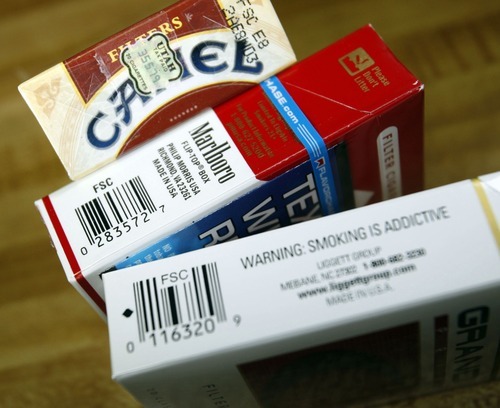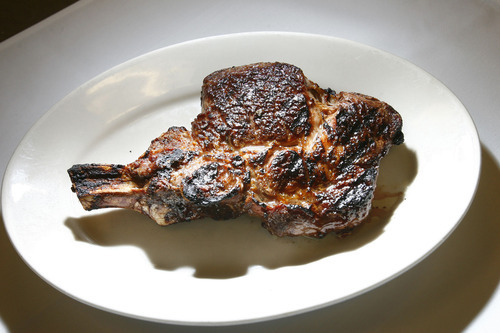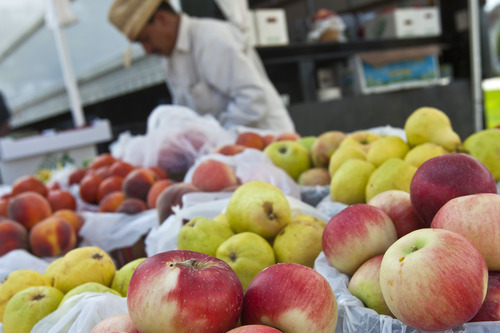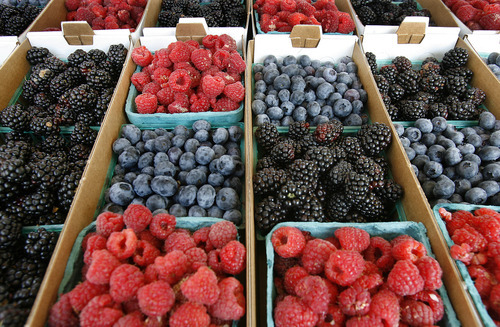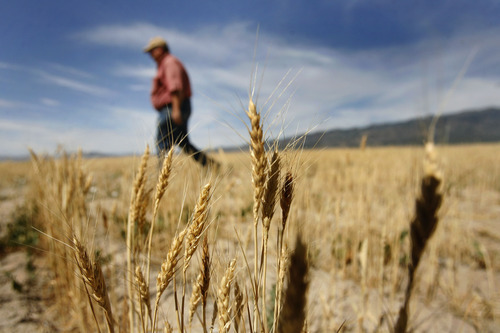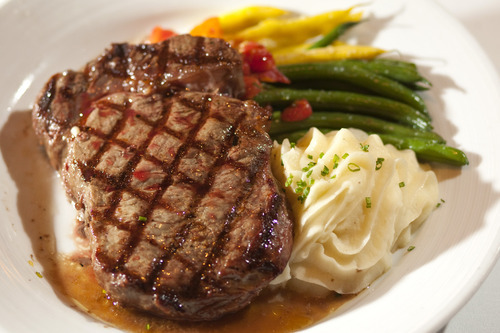This is an archived article that was published on sltrib.com in 2012, and information in the article may be outdated. It is provided only for personal research purposes and may not be reprinted.
Utah's public health officials often credit the state's good health to its predominant Mormon culture.
After all, devout Latter-day Saints' adherence to their faith's health code, called the Word of Wisdom, means many Utahns don't smoke or drink alcohol.
Several studies show such allegiance pays off: Mormons in Utah don't have cancer or heart disease as often.
That helps explain why Utah Mormons live longer than the state's non-Mormons. While some of those extra years — seven for men and almost six for women — are due to the health advice, a 2004 Brigham Young University study suggested the longer lives are also due to well-studied protective factors of being religious.
While the Word of Wisdom also advises against "hot drinks" — defined by LDS leaders as coffee and tea — it's harder to say that Mormons gain many health advantages from avoiding those beverages.
The LDS health code also promotes healthy behaviors — eating fruits, vegetables and grains and limiting meat — but fewer members follow that advice, according to another study by LDS Church-owned BYU.
Maybe they should. Mormons are heavier than those outside their faith, according to a separate BYU study.
"It was well ahead of its time," said Joseph L. Lyon, of the 1833 Word of Wisdom. The doctor and University of Utah professor, a Mormon who has specialized in studying disease patterns of Latter-day Saints, has collaborated with BYU on many of the studies. "It's saved a lot of people from a lot of misery and extended a lot of people's lives."
Here's a synopsis of the major research on the do's and don'ts of the health tips touted by Mormon founder Joseph Smith:
Tobacco
No surprises here: Tobacco kills you and Smith was right to advise against it. Its use is the leading cause of preventable disease and premature death in the United States.
A cigarette's toxic brew of 7,000 chemicals not only reaches the lungs, but also travels through the blood to tissues throughout the body, which become inflamed and damaged.
Smoking causes most lung cancers and has been linked to others — from the mouth, nose and throat to a woman's cervix. It leads to plaque buildup in the arteries, which can spur heart attacks and strokes. It can make it harder for women to get pregnant and easier for anyone to develop Type 2 diabetes because the chemicals affect blood sugar.
Source • A Report of the Surgeon General: How Tobacco Smoke Causes Disease, 2010. (http://www.cdc.gov/tobacco/data_statistics/sgr/2010/consumer_booklet/pdfs/consumer.pdf)
Alcohol
When it comes to alcohol, Smith was right — and wrong. It all depends on who is drinking, when and how much.
The Harvard School of Public Health labels it a "tonic and a poison."
In moderation — no more than two drinks a day for men or one drink a day for women, regardless of the type of booze — alcohol can lower the risk of heart attacks, certain types of strokes and deaths from all cardiovascular diseases.
Moderate drinkers also have been shown to be less likely to develop gallstones and Type 2 diabetes.
But exercise or eating healthy foods can be just as beneficial. And alcohol's health benefits aren't so clear-cut to lead public health officials to advocate drinking.
Heavy drinking can scar the liver, boost blood pressure and damage heart muscle. It has been tied to several cancers, including breast cancer among women who down two or more drinks a day, not to mention its link to violent crime, auto accidents and addiction.
For certain groups, such as pregnant women or young men, the risks of alcohol — to the fetus or from accidents — outweigh the benefits. But for older men and women at risk for heart disease but not alcoholism, that glass of red wine may be wise.
Sources • Harvard School of Public Health (http://www.hsph.harvard.edu/nutritionsource/what-should-you-eat/alcohol-full-story/index.html); Mayo Clinic. (http://www.mayoclinic.com/health/alcohol/SC00024)
Coffee and tea
Smith admonished against imbibing "hot drinks" — later defined by LDS leaders as coffee and tea. But neither causes harm when consumed in moderation in the general population, and both may have health benefits.
Most often used as a stimulant because of its caffeine, coffee may also protect against Type 2 diabetes, Parkinson's disease, dementia, liver cancer and cirrhosis. It has been linked to lower risks of abnormal heart rhythms and strokes among women.
A recent National Institutes of Health study found older adults who drank coffee — caffeinated or decaf — had lower risk of death overall compared with nondrinkers. Coffee drinkers were also less likely to die from heart disease, respiratory disease, stroke, injuries and accidents, diabetes and infections.
It is unclear, however, if coffee provides the benefit or if coffee drinkers have better diets or exercise more. And since coffee has more than 1,000 compounds, it's unclear what in coffee could be beneficial.
For the general population "coffee is one of the good, healthy beverage choices," Rob van Dam, a Harvard School of Public Health professor, said on the school's website.
According to the National Institutes of Health MedlinePlus database, green tea may help prevent cancers, including ovarian and pancreatic, reduce the risk of Parkinson's, and decrease cholesterol levels and protect against heart disease. It may also help prevent Type 2 diabetes and strokes.
A recent symposium on tea and health, backed by the tea industry, along with the likes of the American Cancer Society and the American Society for Nutrition, extolled the virtues of the second-most-consumed beverage in the world. It presented research linking tea consumption with weight loss, bone and muscle strength and healthier hearts.
"The many bioactive compounds in tea appear to impact virtually every cell in the body to help improve health outcomes, which is why the consensus emerging from this symposium is that drinking at least a cup of green, black, white or oolong tea a day can contribute significantly to the promotion of public health," Jeffrey Blumberg, director of the antioxidants research laboratory at the Jean Mayer USDA Human Nutrition Research Center on Aging at Tufts University, said in a news release.
The Mayo Clinic says the health benefits of coffee outweigh the risks, which can include restlessness, anxiety, irritability and sleeplessness for those who drink a lot of caffeine. It can also cause mild dependence and lead to withdrawal symptoms. Since tea also contains caffeine, it can have similar side effects.
Of course, those problems can surface with other caffeinated drinks, including soda.
A 2006 BYU study finding that Mormons are heavier than others hypothesized that drinking coffee could lead to lower weights because the caffeine increases the metabolic rate and induces bowel movements.
LDS leaders recently reaffirmed that the faith's health code does not bar members from drinking caffeinated colas.
"The only official interpretation of 'hot drinks' (D&C 89:9) in the Word of Wisdom," states the faith's leadership handbook, "is the statement made by early church leaders that the term 'hot drinks' means tea and coffee."
That doesn't mean church authorities view caffeinated drinks as healthy. They just don't prohibit members from pounding a Pepsi or sipping some hot cocoa.
When asked, LDS leaders declined to say what substances in coffee and tea are harmful. Instead, a church spokesman noted that for questions not addressed by church teachings "members are expected to exercise wisdom in applying the principles of good health."
The LDS Church does interpret the misuse of drugs — illegal, legal, prescription or controlled — as a violation of its health code.
Sources • Harvard School of Public Health, Mayo Clinic; WebMD; National Institutes of Health; MedlinePlus.
http://www.nlm.nih.gov/medlineplus/druginfo/natural/960.htmlhttp://www.nih.gov/news/health/may2012/nci-16.htmhttp://www.webmd.com/food-recipes/features/coffee-new-health-foodhttp://www.mayoclinic.com/health/coffee-and-health/AN01354http://www.hsph.harvard.edu/nutritionsource/questions/coffee/
Grains, veggies and meat
The Word of Wisdom also guides Mormons on what to eat — wheat, rice, vegetables and fruit. And it warns to eat meat sparingly. That's sound advice for keeping weight off and the body healthy.
Eating whole grains, instead of the refined kind,reduces the risk of cardiovascular disease and Type 2 diabetes, and it may protect against cancer. The fiber also prevents constipation.
Ditto for eating plenty of fruits and vegetables.
As for limiting meat, that's especially wise when it comes to red meat. Even noshing moderate amounts can increase the risk for colon cancer, heart disease and diabetes, as well as death from cancer and heart disease. Processed meats are even more strongly linked to cancer, heart disease and diabetes.
As alternatives, beans, nuts and whole grains provide protein and can protect against disease.
Folks who follow a plant-based diet tend to eat fewer calories and weigh less.
Sources • Harvard School of Public Health; http://www.meatlessmonday.com/ Mayo Clinic. http://www.mayoclinic.com/health/meatless-meals/my00752
What the Word of Wisdom says
Mormon founder Joseph Smith outlined this health code, called the Word of Wisdom, in February 1833. Here are some verses as recorded in the faith's Doctrine and Covenants:
"Inasmuch as any man drinketh wine or strong drink among you, behold it is not good, neither meet in the sight of your Father, only in assembling yourselves together to offer up your sacraments before him.
"And, behold, this should be wine, yea, pure wine of the grape of the vine, of your own make.
"And, again, strong drinks are not for the belly, but for the washing of your bodies.
"And again, tobacco is not for the body, neither for the belly, and is not good for man...
"And again, hot drinks are not for the body or belly.
"And again, verily I say unto you, all wholesome herbs God hath ordained for the constitution, nature, and use of man —
"Every herb in the season thereof, and every fruit in the season thereof; all these to be used with prudence and thanksgiving.
"Yea, flesh also of beasts and of the fowls of the air, I, the Lord, have ordained for the use of man with thanksgiving; nevertheless they are to be used sparingly;
"And it is pleasing unto me that they should not be used, only in times of winter, or of cold, or famine.
"All grain is ordained for the use of man and of beasts, to be the staff of life, not only for man but for the beasts of the field, and the fowls of heaven, and all wild animals that run or creep on the earth;
"And these hath God made for the use of man only in times of famine and excess of hunger.
"All grain is good for the food of man; as also the fruit of the vine; that which yieldeth fruit, whether in the ground or above the ground."
Source: Doctrine and Covenants 89: 5-16


